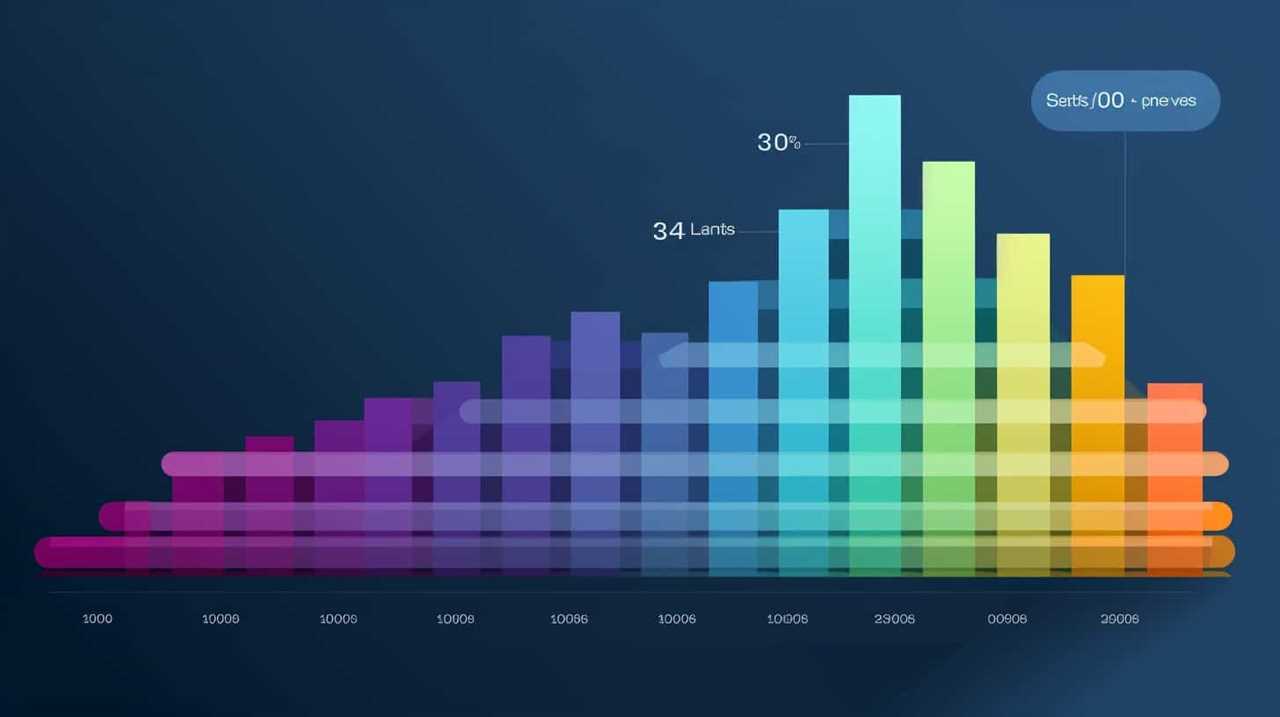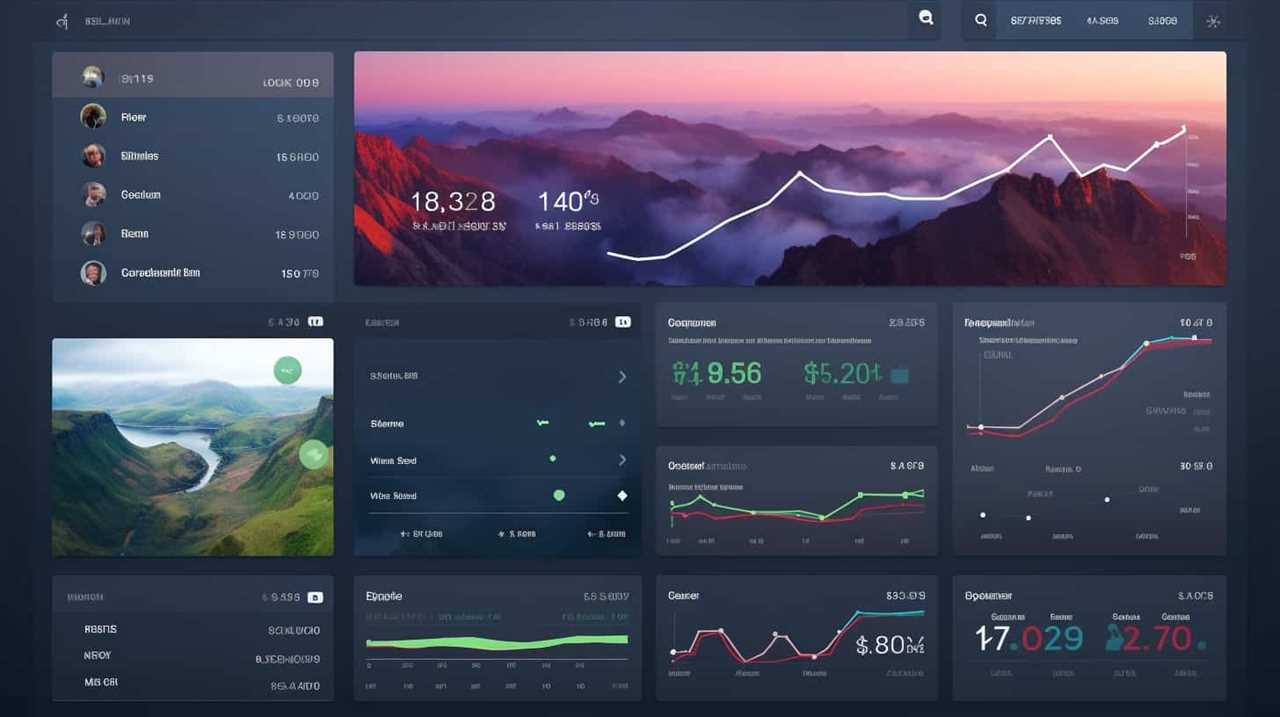Looking to master the art of pinpointing SEO keywords? Your search ends here! We provide all the vital tips and techniques you need to achieve expertise.
In this concise and informative guide, we’ll show you how to:
- Utilize tools like Google Keyword Planner
- Analyze competitor keywords
- Incorporate user intent into your keyword strategy
Get ready to optimize your on-page content and track your keyword performance like a pro.
Let’s dive in and become keyword masters together!

Key Takeaways
- Keyword competition and relevance are crucial factors in SEO success.
- Utilizing keyword research tools helps identify high volume keywords with low competition.
- Analyzing competitor keywords provides valuable insights and uncovers optimization opportunities.
- Incorporating user intent and search trend data enhances keyword selection and content optimization.
Keyword Research: Understanding the Basics
We begin by delving into the essential process of conducting keyword research for SEO, which involves understanding the basics.
Understanding keyword competition and the importance of keyword relevance are two crucial aspects of this process.
Keyword competition refers to the level of difficulty in ranking for a particular keyword. By analyzing the competition, we can identify keywords that have a higher chance of ranking well in search engine results.
On the other hand, keyword relevance is about selecting keywords that align with the content and purpose of our website. Relevance is important because it ensures that our website appears in front of the right audience, increasing the likelihood of attracting qualified traffic.

Utilizing Google Keyword Planner
To further enhance our keyword research for SEO, we can harness the power of Google Keyword Planner. This tool is a valuable resource that provides insights into search volume, competition, and potential keyword ideas.
However, it’s important to note that there are alternative tools available, such as SEMrush and Ahrefs, which offer advanced features for keyword research. These alternatives can provide additional data and analysis to help refine our SEO strategy.
When using Google Keyword Planner, it’s essential to utilize advanced techniques for keyword research. This includes exploring long-tail keywords, analyzing competitor keywords, and identifying keyword trends.
Exploring Competitor Keywords
Utilizing Google Keyword Planner for keyword research, we can now delve into exploring competitor keywords. When it comes to SEO, understanding your competitors’ strategies and analyzing their keywords is crucial for success. By identifying the keywords they’re targeting, you can gain valuable insights and uncover new opportunities for your own SEO strategy.

Competitive keyword analysis involves researching the keywords your competitors are using in their content, meta tags, and other SEO elements. This information can help you identify high-performing keywords and optimize your own content to outrank your competitors.
Analyzing Long-Tail Keywords
When analyzing long-tail keywords, our focus is on identifying specific and niche terms that can drive targeted traffic to our website. Here are four key points to consider:
- Analyzing keyword competition: It’s crucial to assess the level of competition for each long-tail keyword. This helps us understand how difficult it will be to rank for that particular term.
- Long tail keyword optimization: We need to ensure that our website’s content is optimized for the identified long-tail keywords. This involves incorporating them naturally into our page titles, headings, and content.
- Targeting specific audience needs: Long-tail keywords allow us to target specific search queries and cater to the needs of our audience. By identifying these niche terms, we can provide valuable and relevant content that meets their specific requirements.
- Driving targeted traffic: Long-tail keywords have the potential to attract highly relevant and motivated visitors. By focusing on these specific terms, we can increase the chances of converting these visitors into customers or leads.
Leveraging Keyword Research Tools
Now that we’ve analyzed long-tail keywords and identified specific terms to drive targeted traffic, how can we leverage keyword research tools to further enhance our SEO strategy?
Keyword research tools are essential in finding high volume keywords that can boost our website’s visibility and increase organic traffic. These tools provide valuable insights into search trends, competition levels, and keyword performance metrics.

By using these tools, we can refine our keyword research techniques and uncover new opportunities to optimize our content. They enable us to identify relevant keywords that have high search volumes, low competition, and align with our target audience’s search intent.
With this information, we can create targeted and optimized content that will rank higher in search engine results pages (SERPs) and attract more organic traffic.
Incorporating User Intent Into Keyword Strategy
To optimize our SEO strategy, we must consider the user intent and incorporate it into our keyword strategy. Understanding user intent in keyword research is crucial for driving organic traffic to our website. Here are four ways to incorporate user intent into our keyword strategy:
- Analyze search queries: By examining the specific keywords and phrases that users are searching for, we can gain insights into their intent and tailor our content accordingly.
- Consider the user’s journey: Understanding where the user is in their journey, whether it’s informational, navigational, or transactional, helps us develop targeted keywords that align with their needs.
- Look for long-tail keywords: Long-tail keywords often indicate specific user intent. By targeting these keywords, we can attract more qualified traffic and improve conversion rates.
- Study user behavior: By analyzing user behavior metrics such as bounce rate and time on page, we can gain a deeper understanding of user intent and optimize our keyword strategy accordingly.
Incorporating user behavior into our keyword strategy allows us to create content that meets the needs and expectations of our target audience, ultimately improving our SEO performance.

Using Search Trend Data for Keyword Selection
We can enhance our keyword selection by leveraging search trend data. Utilizing social media for keyword research is an effective way to gain insights into popular topics and keywords that are currently trending. By monitoring hashtags, discussions, and user-generated content on platforms like Twitter, Instagram, and Facebook, we can identify keywords that are relevant to our target audience and align our content accordingly.
Additionally, using customer reviews for keyword selection can provide valuable information about the language and terminology that our customers use when searching for our products or services. Analyzing the keywords and phrases that appear frequently in customer reviews can help us optimize our content and improve our search engine rankings.
Incorporating search trend data and customer reviews into our keyword selection process ensures that we’re targeting the right keywords and staying up-to-date with the latest trends in our industry.
Optimizing On-Page Content With Keywords
To optimize on-page content with keywords, our team focuses on incorporating relevant and strategically placed keywords throughout the website. Here are some tips for incorporating keywords into your website content:

- Conduct thorough keyword research to identify the most relevant and high-performing keywords for your industry and target audience.
- Place keywords in the page title, meta description, headings, and subheadings to signal to search engines what the page is about.
- Use keywords naturally in the body of your content, ensuring that they fit contextually and don’t disrupt the flow of the writing.
- Optimize image alt tags and file names with keywords to improve your website’s visibility in image searches.
By following these tips, you can enhance your website’s SEO and increase its chances of ranking higher in search engine results pages.
Remember to strike a balance between incorporating keywords and maintaining high-quality, user-friendly content.
Tracking and Monitoring Keyword Performance
Now let’s talk about the importance of effective keyword tracking and monitoring to improve SEO rankings.
By analyzing keyword performance, we can gain valuable insights into which keywords are driving traffic and conversions.

This data allows us to make informed decisions and optimize our SEO strategy for better results.
Effective Keyword Tracking
Effective keyword tracking is crucial for monitoring and improving keyword performance in SEO. To ensure the success of your SEO strategy, here are four essential techniques for effective keyword tracking:
- Rank tracking: Monitor your keyword rankings regularly to gauge their performance and identify areas for improvement.
- Competitor analysis: Keep an eye on your competitors’ keyword rankings to stay ahead of the game and uncover new opportunities.
- Conversion tracking: Measure the effectiveness of your keywords by tracking the conversions they generate, such as form submissions or purchases.
- Click-through rate (CTR) monitoring: Track the CTR of your keywords to understand how well they resonate with your audience and optimize accordingly.
By employing these keyword tracking techniques and measuring keyword effectiveness through rank tracking, competitor analysis, conversion tracking, and CTR monitoring, you can continuously refine your SEO efforts and achieve better results.
Stay vigilant and adapt your strategy based on the insights gained from effective keyword tracking.

Analyzing Keyword Performance
We continue to analyze keyword performance by tracking and monitoring how our keywords are performing in our SEO strategy. Analyzing keyword trends allows us to stay updated on the latest search patterns and user preferences.
By measuring keyword effectiveness, we can determine which keywords are driving the most traffic and conversions to our website. This information helps us make informed decisions about our SEO efforts and refine our keyword strategy for optimal results.
We use various tools and analytics platforms to track keyword rankings, organic traffic, and conversion rates. These insights allow us to identify opportunities for improvement, such as targeting new keywords or optimizing existing content.
Improving SEO Rankings
To improve SEO rankings, we focus on tracking and monitoring keyword performance. This allows us to identify which keywords are driving the most traffic to our website and make informed decisions on how to optimize our content for better visibility.

Here are four key strategies to improve SEO rankings:
- Conduct regular keyword research to identify relevant and high-volume keywords.
- Monitor keyword rankings to track progress and identify areas for improvement.
- Analyze website analytics to understand how keywords are driving organic traffic.
- Optimize website content by incorporating keywords naturally and strategically.
By implementing these strategies, we can improve our website visibility and increase organic traffic, ultimately boosting our SEO rankings.
It’s important to continuously track and monitor keyword performance to stay ahead of the competition and make data-driven optimizations.
Frequently Asked Questions
How Do I Determine Which Keywords Are Most Relevant to My Specific Industry or Niche?
Determining the most relevant keywords for our specific industry or niche requires us to follow best practices for conducting keyword research in a competitive industry. By targeting long tail keywords, we can achieve better SEO results.

It’s crucial to understand the needs and preferences of our target audience to select the right keywords. Conducting competitor analysis and utilizing keyword research tools can provide valuable insights.
Once we have a list of potential keywords, we can analyze their search volume, competition, and relevance to make informed decisions.
Are There Any Alternative Keyword Research Tools Besides Google Keyword Planner That I Can Use?
There are several alternative keyword research tools available to help with finding relevant keywords for SEO. These tools can provide valuable insights and suggestions for keyword optimization.
In addition to Google Keyword Planner, some popular options include SEMrush, Moz Keyword Explorer, and Ahrefs. These tools offer various features and functionalities to assist in identifying the right keywords for your industry or niche.

What Are Some Effective Strategies for Incorporating User Intent Into My Keyword Strategy?
Incorporating user intent into our keyword strategy is crucial for effective SEO. By understanding search intent, we can better target keywords that align with what users are looking for.
One strategy is to use long tail keywords, which are more specific and can capture user intent. By incorporating user intent into our keyword strategy, we can optimize our website for relevant searches and drive more targeted traffic.
How Can I Track and Monitor the Performance of My Keywords Over Time?
When it comes to tracking and monitoring the performance of our keywords over time, one effective strategy is to use a keyword tracking tool.
These tools allow us to see how our keywords are performing in search engine rankings and track any changes over time.

Is It Possible to Optimize On-Page Content for Multiple Keywords Without Keyword Stuffing?
When optimizing on-page content for multiple keywords, it’s crucial to avoid keyword stuffing. Instead, we focus on effective strategies for user intent and keyword tracking.
By understanding the intent behind each keyword and crafting high-quality, informative content that meets those needs, we can optimize for multiple keywords without resorting to stuffing.
This approach ensures that our content remains user-friendly and valuable, leading to improved SEO performance and higher rankings in search engine results.
Conclusion
In conclusion, mastering keyword research is essential for successful SEO.

By understanding the basics and utilizing tools like Google Keyword Planner, analyzing competitor keywords, and incorporating user intent into our strategy, we can optimize our on-page content and track keyword performance effectively.
Just as a well-crafted keyword strategy unlocks the door to higher search rankings and increased organic traffic, it also holds the key to unlocking our website’s full potential.
So, let’s unlock success together by harnessing the power of keywords.










